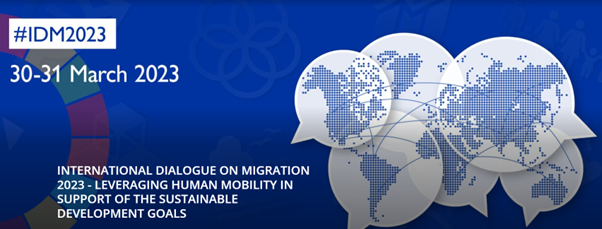Eventos
International Dialogue on Migration (IDM)
The 2030 Agenda for Sustainable Development (2030 Agenda) marks the first-time migration has been fully recognized as a core development consideration by the international community. The 2030 Agenda consists of 17 Sustainable Development Goals (SDGs) and 169 accompanying targets – eight of which are explicitly linked to human mobility and all of which have an impact on, or are impacted by, human mobility.
Strengthening the positive impact of human mobility on societies and sustainable development can help to advance key priority areas of the UN Common Agenda and 2030 Agenda and support the role of human mobility as a global public good for a renewed global social contract. This means understanding migration and displacement in the broader context of challenges to the social contract – such as inadequate health systems; gaps in social protection; or environmental degradation – and reinforcing the role of migration to build stronger communities, thereby ensuring that the future of human mobility is embedded in multilateral and national frameworks for the years to come.
The forthcoming SDG Summit, which will take place in September 2023, marks the mid-way point of the implementation of the 2030 Agenda, and an opportunity to assess progress towards the SDGs. In support of these common efforts, both sessions of the International Dialogue on Migration (IDM) – in New York and Geneva – will focus on assessing how migration – and IOM – can further contribute to the attainment of the SDGs, leaving no one behind.
The two sessions of the IDM are part of a broader global process to develop transformative and accelerated actions leading up to the target year of 2030 for achieving the SDGs. In this context, the IDM will be timely in the lead up to global commitments that include the High-Level Political Forum on Sustainable Development (HLPF), the UN High-level meeting on universal health coverage (UHC-HLM), the SDG Summit, and the Summit of the Future. It will also guide IOM’s own contributions to attaining the SDGs and particular IOM contributions to the Summit of the Future and other key UN processes, including by discussing and contributing to refine “acceleration points”, which were first introduced by IOM in its submissions to the HLPF in 2020. These actions – in the context of major global transformations that already present and will continue to generate an evolving set of challenges and opportunities in relation to human mobility – apply an integrated approach to migration, recovery and sustainable development, and build on the opportunities the GCM objectives can bring for the achievement of the SDGs individually and as a whole
